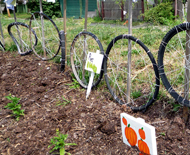Future Now
The IFTF Blog
The Other Kind of “Makers”
While American cities are rightfully viewed as rich pools of human capital, innovation and industry, they are also often seen in the opposite light, too, as drains for public resources, as hopeless places of dependency and undeserved entitlement.
 This latter view of cities as populated by so-called “takers” persists despite a solid body of research to the contrary. According to research by the Insight Center in Oakland, California, an informal cash and barter economy of self-employed individuals and small enterprises consists of some 4.2 million workers nationwide who drive an often unnoticed stream of economic activity thriving outside the formal economy. They are artists, trades people, chefs, musicians, and a wide range of other occupations. Persistently high unemployment rates and even higher underemployment rates drive much of this activity as these small-scale entrepreneurs and other self-starters find a livelihood for themselves outside of the institutionally-based economy that excludes them due to their lack of education or because of their race or immigration status.
This latter view of cities as populated by so-called “takers” persists despite a solid body of research to the contrary. According to research by the Insight Center in Oakland, California, an informal cash and barter economy of self-employed individuals and small enterprises consists of some 4.2 million workers nationwide who drive an often unnoticed stream of economic activity thriving outside the formal economy. They are artists, trades people, chefs, musicians, and a wide range of other occupations. Persistently high unemployment rates and even higher underemployment rates drive much of this activity as these small-scale entrepreneurs and other self-starters find a livelihood for themselves outside of the institutionally-based economy that excludes them due to their lack of education or because of their race or immigration status.
This level of enterprise is, not surprisingly, also reflected in worker’s ethos. Opinion surveys conducted by Pew and others between 2008 and 2012 show that far from being takers, most Americans see themselves as “makers.” 64% surveyed believe that government should let people get ahead on their own and not interfere in a free market. 66% of respondents believe there is economic opportunity out there. 61% do not favor increased government spending. When asked if government is responsible for creating jobs, 61% answer no. And when asked who should help laid off workers, 42% of respondents say workers themselves, 32% say employers. At the bottom of the list is government, which just 26% say should be mainly responsible.
So far from seeing themselves as takers, most Americans see themselves as primarily responsible for their economic livelihood. But those surveyed also see a role for employers and government in helping. Given the well-known data on the damaging effects that structural conditions such as low wages, extreme wealth inequality and poor educational systems have in large cities, it is only sensible that workers, employers and government each play a collaborative role in improving opportunities and invigorating economic activity.
The resourcefulness of the informal economy and the “maker” ethos as seen in the surveys point to a future of creativity and personal industry, leveraged on a shoe-string if need be but driven by a do-it-yourself attitude that reflects the reality that American cities are more enlivened by makers than held back by the mythical “takers.”
 David Thigpen is an IFTF 2013 "Future for Good" Fellow. The Future for Good Fellowship Program starts with six fellows joining us for months—from May-August 2013—to create visions and develop actions for our collective good.
David Thigpen is an IFTF 2013 "Future for Good" Fellow. The Future for Good Fellowship Program starts with six fellows joining us for months—from May-August 2013—to create visions and develop actions for our collective good.



